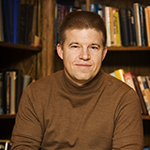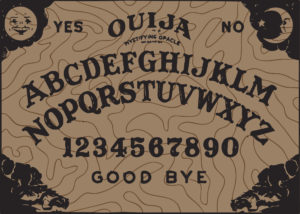 by Jon Mullican
by Jon Mullican
When I was about 10 years old, growing up in central Oklahoma, several of my brother’s friends brought a game to our house: the Ouija Board. One friend explained to my brother and me how the game worked: pose a question to the board; all place a hand on the planchette (we called it the “thingy”); in complete silence, watch as the thingy moves (what made it move?) to different letters to spell out the answer to the question.
brought a game to our house: the Ouija Board. One friend explained to my brother and me how the game worked: pose a question to the board; all place a hand on the planchette (we called it the “thingy”); in complete silence, watch as the thingy moves (what made it move?) to different letters to spell out the answer to the question.
The questions we posed ranged from silly to serious: Who is in love with Andy (my brother)? Where is the closest buried body? Will we win our baseball game tonight? Who killed JFK? It was fun for a while. The answers were often hilarious, sometimes nonsensical, and other times spooky. For a 10 year old, the game was mystifying, alluring and a bit disturbing. How did this thing know what it knew? Were the answers real? Was anyone in control? Eventually, the game’s luster wore off and we moved to other more important things, like bike riding or kickball.
As I have engaged church leaderships over the last 17 years, I’ve witnessed a form of this game being played. A question is posed to the group. While there is no “thingy” on which to place hands, people begin to wrestle with the question. Debate ensues. Statements are made; some are even heard. Things start getting pushed around by invisible forces: tradition, bias, love, anger, hope, accommodation, competition, compromise, values, anxiety, friendship, doubt, belonging, desire, and fear. Answers begin to emerge from the chaos of words and feelings and frustration and optimism mixing in the room. When an answer finally comes (often after hours and hours, maybe even days), what really happened in the room? Who or what is moving “this thing” anyway? Is it the Holy Spirit or some other “spirit?” We often believe we can dissect the room’s activities and conclude that it was tradition that gave the answer, or fear, or accommodation. Yet without stopping the “game” and calling directly for disclosure of feelings and concerns and desires, the real forces at work are hidden from those in the room, not to mention those affected by the decision who are never present but impacted greatly by the answer to the question.
What elevates leadership functioning above this Ouija Board method to one that is thoughtful, trust-filled, revealing and God-breathed? Can a group of people find ways of working together that limit the man-made mystery that moves “things” and provide deep meaning, satisfaction, camaraderie, and ultimately God-filled, God-ordained leading? I believe the answer is an unequivocal “YES!” Future blogs will explore how church leadership can move away from mysterious Ouija Board Leadership and toward leadership that is open, authentic, God-honoring and able to act on what matters most.
What leadership situation can you recall that felt Ouija Board-like?
What factors enhance open conversation within your leadership team?

Leave a Reply